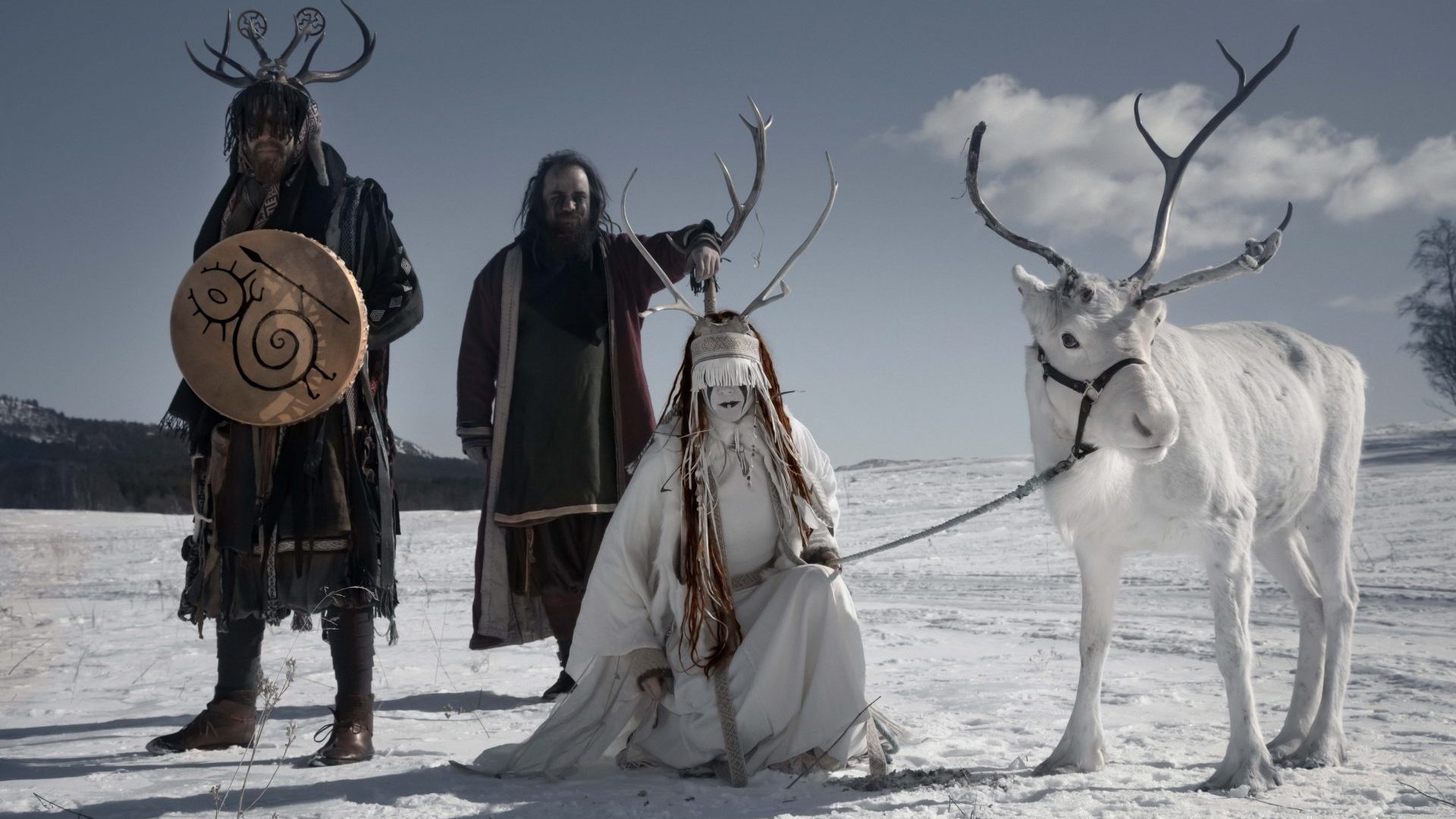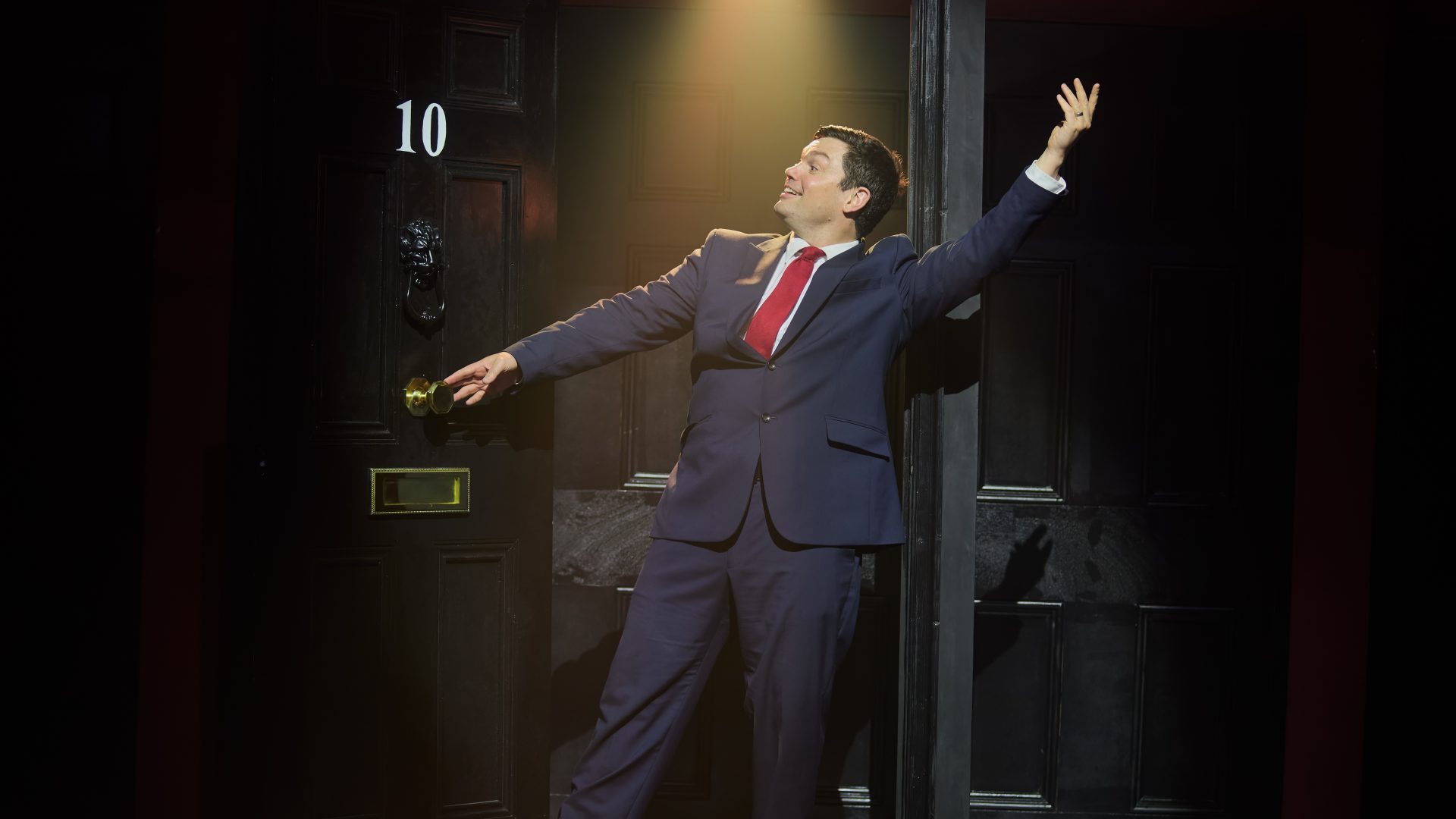There is comfort in the past, even when that past was dark and brutal.
The ancient-sounding music of German-Danish-Norwegian band Heilung, who bill themselves as “amplified history from early medieval northern Europe”, has slotted neatly into pop culture’s current enthusiasm for a bloody and merciless northern European past, appearing on the soundtrack or in trailers for the high middle ages-referencing fantasy of Game of Thrones, the History Channel’s Vikings series and Robert Eggers’ revenge saga The Northman.
But on their forthcoming new album Drif, this trio who perform adorned with antlers and skulls, feathers and furs, blurring the lines between animal and human, earthly and supernatural in an evocation of pagan ritual, have a more optimistic message than their forbidding image suggests.
Although it involves no digital sampling and uses reconstructed ancient instruments, Heilung’s music does not claim any historical authenticity, instead laying a mosaic of sonic influences over a folk foundation. Drif has plenty to please world music fans, not least the lead single released last week, Anoana, while Tenet has high-pitched growled vocals directly descended from Norwegian black metal and ends up more than flirting with psytrance. Buslas Bann has the abrasive vocals and brutal beats of the German pioneers of industrial music.
Lyrically, Heilung have borrowed directly from the sources of the past, just as they did on their debut album Ofnir (2015) and 2019’s follow-up Futha, where they used inscriptions on artefacts like rune stones, preserved spear shafts and amulets, as well as the words of ancient poems. The sources on Drif include the Old Norse poem Hávamál, the Sator Square palindrome found at Pompeii, a Roman army marching song preserved in Suetonius’ Life of Julius Caesar, rune carvings from the stave churches of Nore and Lomen in
Norway, and 7th century-BC clay tablets bearing the fifty names of Marduk, the highest god of the Mesopotamians.
There is plenty of darkness on Drif, and it is easy to see why their music has been used to soundtrack recent lurid screen histories. Keltentrauer, a poem narrated in modern German which recounts a devastating battle between Romans and Celtic tribes, dissolves in bloodcurdling screams. The sombre Nesso, based on a healing spell for horses, evokes a time when sickness was rife and fundamentally misunderstood. Marduk, with singing bowls creating an ominous, all-consuming hum, and whispered lyrics which become an urgent chant, finishes the album on a deeply sinister note.
But since this is a band whose name means “healing” and Drif itself means
“gathering” – “like little flames seeking towards each other, to join, to bond, to create, and be greater together”, the band have explained – the ultimate
message of this, an album made in the darkness of lockdown, is one of rebirth and harmony, underpinned by a respect for the natural world.
The opener Asja is a drone-led hymn “of love, recovery and prosperity”. Nikkal, the band’s version of the oldest surviving complete work of annotated
music, the 3400-year-old Hymn to Nikkal found carved in clay tablets in the Canaanite city of Ugarit in modern-day Syria, is a choral incantation seeking ‘fertility and cleansing’ from the goddess of the title.
Even Buslas Bann, inspired by a curse from the Icelandic Bósa saga, resolves into something positive: “We start out singing the devastating words that are supposed to bring downfall and terror. Line by line we change it into a blessing, like sun follows rain and spring follows winter.” On a historical note, the band are keen to ‘make us rethink how dark these ages really were’, given the cultural and material wealth of that time and place.
For all the darkness on Drif, it cannot exist without light. “The understanding that the seed has to die in order to spark vitality can bring back our joy of life in the face of death”, the band have explained, “Music and dance is the primal language of mankind. In it, we can experience the divine harmony woven through all of existence.” Heilung is the music of the earthy and the elemental, where the tangibility of nature both enables the
transcendental and offers a solid grounding in an uncertain world.
HEILUNG in five songs
Hakkerskaldyr (2015)
From the band’s self-released album Ofnir, this song, combining an ethereal drone over a war-like chant, featured in a trailer for The Northman.
Fylgija Ear (2015)
Using the eighth- or ninth-century Old English rune poem, this track, which is typical of the band’s blend of metal, world music and trance influences, was one of three of Heilung’s songs featured in Canadian TV series Vikings.
Opening Ceremony (2017)
Heilung’s live album Lifa captured the band’s startling debut performance in
the Netherlands in 2017. This track is their guiding mantra: “Remember, that we all are brothers/ All people, beasts, trees and stone and wind”.
Norupo (2019)
From Heilung’s second album Futha, the video for this single was filmed at
Brittany’s neolithic standing stones, Les Menhirs de Monteneuf.
Anoana (2022)
The first single from Drif, this uplifting track takes its lyrics from bracteates
(medal-like golden amulets of the early middle ages) found in Denmark and Norway. With it, the band intends the track to give the listener “a touch
of magic from the Dark Ages”.




